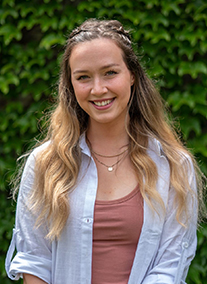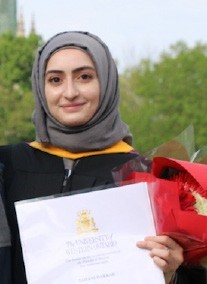Alumni Share Their Stories

Brianne O’Sullivan, Class of 2021
In the fall of 2020, I began my global health journey with Western’s professional program in Global Health Systems. Following the first six months of an unprecedented global pandemic working in frontline health services, I no longer had any doubt that a career in global public health was my future. Though taking an intensive, full-time master’s program entirely online was intimidating to say the least, the ability to learn about the global health field while immersed in what would be known as the darkest years of the pandemic was a truly unique experience. With courses focused on global health equity, research, policy, and practice – complemented with professional development seminars from experts in the field – my classmates and I spent the first 8 months of the program absorbing as much information as we could while developing the skillsets we would need beyond our graduate education. During the first semester, I connected with my now-PhD supervisor, Dr. Elysée Nouvet, a Global Health Systems faculty member at Western. The unit of her course on Drones for Health inspired me to pursue my doctoral studies on this topic.
The final four months of the program included a three-week field school in Uganda (completed virtually for my cohort), followed by a three-month professional placement. Despite being online, the field school was an incredible experience to learn from Western’s international partners in Uganda, such as the Joint Clinical Research Centre and the Rakai Health Sciences Program. In April-May 2022, my cohort was invited to join the current class for their in-person field school – an opportunity I immediately jumped on and one of the reasons I refer to 2022 as one of the best years of my life. Over the three weeks in Uganda, we visited the partners I’d met virtually the year before and toured the various levels of Uganda’s healthcare system – from ground level community health services to state-of-the-art clinical institutions.
During my master’s placement back in 2021, I was also able to pursue my passion for technological innovation in global health with an international NGO, WeRobotics. For my main placement project, I had the opportunity to lead a research analysis with the World Health Organization (WHO) on the use of medical delivery drones in sub-Saharan Africa. This project ended up informing my PhD dissertation, for which I will be travelling to Africa to complete in 2024. Not only did this opportunity set me up for my doctoral research, it was also what gave me the experience needed to secure a position working on Canada’s WHO team.
In my first month after completing my master’s with Western, I applied and was selected as the 2022 Canadian Youth Delegate to the World Health Assembly and Pan American Health Organization Directing Council, the governing bodies of the WHO and Pan American Health Organization, respectively. As the Canadian Youth Delegate, I attended the 76th World Health Assembly in Geneva and the 30th Pan American Sanitary Conference in Washington, D.C. as an official member of the Canadian Delegation. This was my first opportunity to put my new skills and expertise to the test. After working closely with the Government of Canada’s Office of International Affairs in 2022, I was hired as a policy analyst on the WHO team and as the lead analyst on developing new youth engagement strategies for the federal government. Through this role, I have been given a platform to advocate for equity, diversity, and inclusion within Canada’s public and global health decision-making processes.
After completing my PhD, I hope to combine my interests in global health equity and technological innovation by working in international health policy at multilateral institutions such as the WHO or United Nations. The last three years have accelerated me towards achieving this goal, and I credit Western Global Health Systems program with providing me the critical foundation to be where I am today. My advice to current or incoming students is to take this next year to truly immerse yourself in the lessons and opportunities that will arise from this program. Make connections, network, and pursue the topics that you’re passionate about. In my experience, there is no better way to learn everything you need to know before beginning a career in global health.
Alumni - Tahani Dakkak

Tahani Dakkak
What project did you undertake as a Queen Elizabeth II Scholar (QEII) enrolled in the MMASc in Global Health Systems?
I was placed in Kampala, Uganda and worked as an intern at Mulago National Referral Hospital and the Makerere University – Johns Hopkins University Research Collaboration (MUJHU). At Mulago, I launched my project “Practice Humanity, Be The Remedy”, a medical funding initiative to fund medical tests and medications for patients who can’t afford them.
At MUJHU, I participated in HIV outreach activities to test local residents for HIV, as well as HIV psychosocial groups that facilitated discussions on topics such as drug adherence and disclosure.
What does being a QE Scholar mean to you?
Being a QE Scholar is a responsibility that motivated me to get out of my comfort zone and thrive abroad. I feel honored to be part of a community of peers and scholars who have travelled abroad to create a lasting impact. The efforts of every member of this community is a living proof that through hard work and determination, every individual, once given the right opportunities, can create an impact to help developing countries prosper and develop.
How did your experience as a QE Scholar impact your education and training?
Designing an intervention in a foreign country exposed me to many unfamiliar obstacles, which significantly enhanced my interpersonal skills. Working abroad has also allowed me to build a global network and enhance my adaptability and self-reliance. It gave me the opportunity to discover my potential as a young global leader who wants to be an agent of change and helped me start something in Uganda that will grow over the years.
Why did you pursue MMASc in Global Health Systems at Western?
I wanted to specialize in health management in Africa because of the complex interplay factors that lead to today’s health disparities, which I have a desire in learning more about. The MMASc in Global Health Systems at Western stood out because it focuses on Africa and the curriculum incorporates a three-month placement in Africa, which gave me the opportunity to apply my knowledge and transform it into action.
Why are you interested in global health? What motivates you in this area of study?
My interest in global health stems from my unshakeable commitment to achieve health and social equity worldwide. We continue to have a heartbreaking and unacceptable level of health inequity. Access to healthcare, education, food, clean water and shelter should be a human right, not a privilege. Every one of these elements significantly impacts the health and wellbeing of an individual.
I pursued my master’s degree in global health to equip myself with the necessary training to be a global leader that can create an impact and advocate for those who are less fortunate. As a Muslim, my faith emphasized thriving to build communities and promote prosperity. Therefore, my main source of motivation in this field is my faith, as well as my determination and desire to give people access to the same rights that I have.








